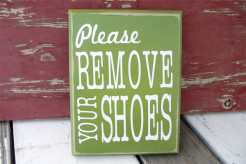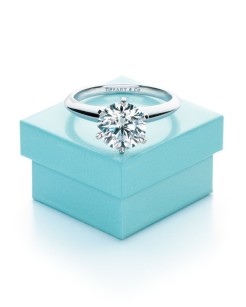Slate’s Emily Yoffe offers advice to a woman who would like visitors to remove their shoes upon entering her home. In the words of the advice-seeker:
“How do I let guests know that I want them to take off their shoes without posting a nagging sign by the door? I always take my shoes off, and I think it’s a polite gesture”
Yoffe’s advice is good. She tells the advice seeker that removing one’s shoes upon entering the home is a reasonable expectation in Japan, but here in America, she needs to forget this ridiculous expectation and allow her guests to keep their sneakers on.

My advice, however, would be slightly different.
I have friends who ask guests to remove their shoes upon entering the home, and they go so far as providing a basket of slippers for their guests (which is nice). Like Yoffe, I find the requirement ridiculous, but I would never tell them that they should end the practice. It’s their home, and they have the right to set the ground rules.
They just have to accept the fact that most people, including myself, find the rule ridiculous.
And because I am who I am, I have made my feelings clear. Upon entering their home a couple year’s ago, the woman said, “You don’t think it’s a big deal to take off your shoes. Right, Matty?”
Clearly she was either sensing my annoyance or had dealt with someone's complaints earlier. Either way, I answered honestly, “Actually, I think the rule is ridiculous and a little rude, but it’s your home, so I follow your rules.”
There were attempts on the woman's behalf to explain why the rule was a good one, including the likelihood that their newborn daughter would soon be crawling on the floors, but ultimately I had to explain to her that I would probably always find the rule ridiculous, but that it would not change the way I felt about her or my desire to visit their home.
Though her husband seemed fine with this, I got the sense that this did not sit as well with her, and I suspect that it would not sit well with the advice seeker in Yoffe’s video, either.
In her letter, the new homeowner is essentially asking Yoffe to explain how she can ask people to remove their shoes upon entering her home without appearing ridiculous, annoying, off-putting and strange.
But here’s the thing:
When you establish rules and customs outside the norms, people will almost always think of you as ridiculous, annoying, off-putting and strange.
You need to either learn to live with this perception or conform.
You can’t ask Americans to remove their shoes upon entering the home without annoying a majority of your guests. It’s simply not something that is done in the majority of American households. Fortunately, most people will lie under these circumstances and assure the homeowner that the rule is understandable and completely sensible. But rest assured that in most cases there will be a subsequent conversation in the car after the visit about the oddity and annoyance of the rule.
I just choose to be upfront and honest when asked a question, even if the answer might make the questioner uncomfortable.
Had I not been asked, I wouldn't have said a word.
In fact, my friend has warned his wife to avoid asking me questions if she might not like the answer.
This is an example of my own ridiculous, annoying, off-putting, strange non-conforming behavior. I have great difficulty telling white lies for the sake of politeness. While I know there was probably a conversation about it after I left the house that day, I understand and accept this. I am being true to myself, and I know that oftentimes that is considered rude.
Unfortunately, most people are unwilling to accept that their non-conformity is different, strange or off-putting.
When my daughter was fourteen months old and still not watching a minute of television, many of our friends and family thought my wife and I were being acting ridiculous. There were probably conversations about us behind our backs.
We were fine with that.
When I threw all my neckties away and began showing up at formal occasions like weddings without one, I am sure that there were many people rolling their eyes and thinking that I was acting like a child.
I’m fine with that.
When I refuse to engage in conversations about the cost and appropriateness of certain gifts, I know that there are people in my life who find my decision to walk away from these conversations rude and unnecessary.
I’m fine with that, too.
I have a whole host of oddities that I am sure offend people.
I don’t say “Bless you” when someone sneezes because doing so presumes a religious belief upon the sneezer and is an empty blessing from me considering my lack of religious belief.
When a guy squeezes too hard when shaking my hand, I say, “Ow! That’s hurts! Who taught you how to shake a guy’s hand?” because accepting the pain without complaint seems silly and subservient to me.
I used to sleep in the shape of a question mark in order to allow my dog to sleep on the bed wherever she liked.
All of these behaviors are not normal, and I would expect my friends and family to think of me as a little odd and possibly foolish.
I accept this.
So I would tell Yoffe’s advice-seeker the same thing I told my friend:
Asking people to remove their shoes upon entering your home is a perfectly reasonable request given that it is your home, but you must also understand that your rule is ridiculous, silly, annoying, and makes you look a little strange. You may believe that this rule is perfectly sensible, but most people do not. As a result, you will always be perceived as the weirdo who makes people remove their shoes at the door.
Just be willing to live with this perception and everything will be fine.















